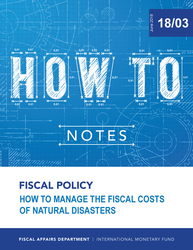
How to Manage the Fiscal Costs of Natural Disasters
This how-to note focuses on the management of the fiscal costs associated with natural disaster risks.
READ MORE...
Volume/Issue:
Volume 2018
Issue 003
Publication date:
ISBN:
Add to Cart by clicking price of the language and format you'd like to purchase
Available Languages and Formats
Topics covered in this book
This title contains information about the following subjects.
Click on a subject if you would like to see other titles with the same subjects.
Economics- Macroeconomics , Public Finance , Natural Disasters , FADHTN , HTN , fund , financing , contingency reserve , cost , cash flow , unexpended LDRRMF funds , investment strategy , budget reallocation , fund balance , contingency reserve fund , NDF management , contingency financing plan , VRRF resource , disaster risk financing strategy , Natural disasters , Budget planning and preparation , Fiscal space , Fiscal risks , Caribbean , fiscal cost , costs of natural disasters , costs of natural DisastersHow , natural DisastersHow , annual budget , fiscal policy
Summary
This how-to note focuses on the management of the fiscal costs associated with natural disaster risks. Unlike other types of fiscal risks (for example, unexpected macroeconomic changes or materialization of contingent liabilities), a natural disaster presents a unique challenge to fiscal risk-management and budget processes because of its exogenous nature and potentially overwhelming scale. This note discusses how governments can build fiscal resilience against natural hazards and strengthen fiscal management after a disaster, including through budgeting frameworks and other fiscal policies. The note aims to answer three central questions: How large should fiscal buffers be? How should fiscal buffers be built up? How should fiscal buffers be used efficiently and transparently once a natural disaster has struck? These three questions directly relate to fiscal policy, fiscal risk management, and the budget process—all core areas of IMF expertise. To address them, the note focuses on fiscal strategies for financing recovery efforts and considers approaches to mitigate disaster impact. The note also provides guidance on how to conduct regular risk analyses of natural disasters’ potential fiscal consequences and outlines best practices for defining and accounting for the contingent liabilities associated with natural disasters in budgeting frameworks. Finally, the note touches on approaches for risk reduction, disaster risk financing strategies, and risk transfer mechanisms, such as various insurance instruments.
Copyright © 2010 - 2025
Powered by:
AIDC



